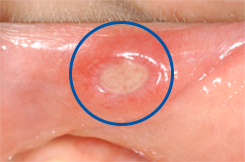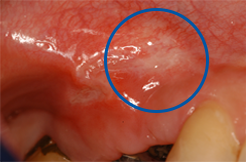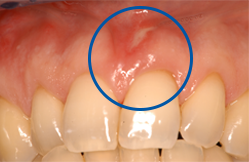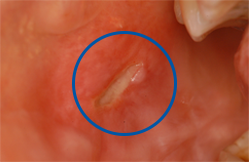MOUTH ULCERS
Recurrent aphthous stomatitis is the most common ulcerative disease of the oral mucosa.
Three forms are distinguished on the basis of their clinical manifestations:
- MINOR MOUTH ULCERS
- MAJOR MOUTH ULCERS
- HERPETIFORM MOUTH ULCERS
- Minor mouth ulcers are the most frequent type, and irthe preferred site is the lower lip mucosa. They look like round ulcerations covered with whitish membranes (white-yellowish underneath) surrounded by a very painful erythematous (red) halo. They have a diameter of less than 1 cm and are also common in children. They heal spontaneously within 10-15 days, but in predisposed patients, they easily recur, which is why we tend to talk about a recurrent disease.
- Major mouth ulcers (those with a diameter greater than 1 cm) appear most frequently on the mucosa of the lips, soft palate, and palatine pillars. They take longer to heal than the minor forms (even up to 1 month) and are more painful due to their extent.
- Aphthous herpetiform stomatitis is characterized by numerous clusters of small, punctiform ulcerations, which may coalesce during development. This disease is often confused with herpes simplex, which, however, only occurs on the keratinised mucosa of the hard palate, the vermilion border of the lips, the lingual dorsum and the fixed gingiva and not on the mucosa of the cheek, the floor of the mouth and inner side of the lips, where non-keratinised mucosa grows, and mouth ulcers develop.
WHAT CAUSES MOUTH ULCERS?
Although aphthous stomatitis has long been the subject of clinical and experimental investigation, the causes remain unclear although exogenous (external to the body) and endogenous factors (internal to the body) that promote its occurrence have been identified.
- Occasional trauma
Biting, vigorous brushing, contact with sharp objects or food such as fish bones or crumbs, burning food and drink, dental treatment, protruding dentures and puncture wounds.
- Harmful microorganisms
Bacteria such as Streptococci, viruses such as Herpes and fungi like Candida that activate upon a drop in immune defenses in wearers of dentures and orthodontic appliances, due to poor oral hygiene or periodontal infections.
- Genetic factors
Mouth ulcers tend to occur when there are previous cases in a family, especially in identical twins.
- Nutritional factors
Anaemia and poor iron, zinc, folic acid, B vitamins.
- Allergies
Intolerance to particular foods or drinks, allergic syndromes caused by drugs.
- Psychological conditions
Excessive work or study stress, anxiety or depression.
- Smoke
Smokers are more prone to mouth ulcers because smoking induces keratinization of the oral mucosa.
Mouth ulcers generally spontaneously regress unless the cause is a specific pathology whose cause must be determined with appropriate tests.



